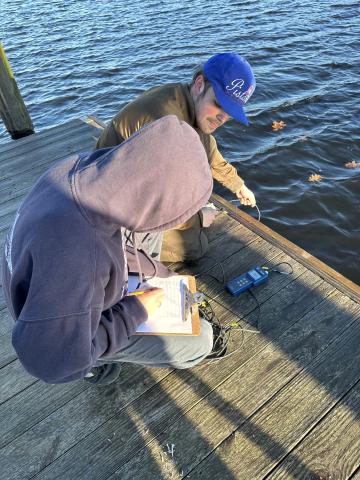Body
Image

Coastal TRACERS: Tech-infused Research and Community-based Experiences for middle and high school students
This DTI ITEST project is a research practice partnership (RPP) among teachers, administrators, community business partners and other stakeholders, education researchers, and University of Maine STEM and STEM education faculty. Together, we are developing and refining a model to bring authentic coastal monitoring and research experiences to middle level and high school students in rural coastal Maine communities. Their investigations will be used to inform community policy decisions and strategic planning. Partners are also developing and disseminating modules for use in courses that use marine sciences examples and data including, but not limited to, science, social studies, and mathematics. As part of the project, teachers are building their knowledge and skills and collaboratively developing learning experiences for their students through summer institutes and school-year work sessions. Through these learning experiences, students will develop their research, working closely with community stakeholders, and build their skills in using technology, computing, collaborating, and communicating. They will also become familiar with career pathways in their communities that use technology and computer science. Research is focused on student outcomes related to data literacy skills and interest in STEM careers. We are also investigating the supports and resources necessary for teachers to implement these changes in the classroom.
Pillar 1: Innovative Use of Technologies in Learning and Teaching
Technology use is primarily focused on data collection and analysis methods to support student data literacy skills. Current examples include having students designing and deploying various sensors to collect data characterizing the local bay. This has included designing boats, buoys, and ROVs to support deployment of the sensors. Future technology use will be informed by learning experiences developed by a second cohort of teachers who will be joining the project this summer.
Pillar 2: Partnerships for Career and Workforce Preparation.
We are building a team of career and community partners in the marine industry to inform and establish mentorships, job shadowing, and other interactions with professionals for students, enhancing career readiness and community ties. This team also informs and supports development of learning experiences that reflect industry needs, equipping students with essential skills for these careers. We will pilot different options next academic year to evaluate characteristics of impactful experiences in coastal communities.
Pillar 3: Strategies for Equity in STEM Education
Partner schools are primarily in small, rural, low-income communities, some of which have significant migrant populations. A goal is to enable to teachers to provide locally-relevant learning opportunities connected to community needs in order to engage students. We focus on integration across disciplines and modifications to core courses enabling all students varied entry points to engage in interest-driven research. Effort is also being made to build a diverse career partnership team to serve as role-models.

Discipline(s)
Interdisciplinary
Target Gradespan(s)
Middle school (6-8)
High school (9-12)
Target Participant(s)
Educators
Project Setting(s)
Formal Education
Category
Developing and Testing Innovations (DTI)